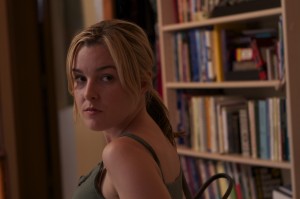“Small, Beautifully Moving Parts” is Smart and Eloquently Funny
A young, soon-to-be mom, estranged from her mother, goes on a road trip to make peace with her past, encountering quirky characters along the way.
This popular “indie road trip” storyline may sound drab in its all-to-familiarity. However, Small, Beautifully Moving Parts, co-directed by Lisa Robinson and Annie J. Howell, has elegance in its understated comedic voice that allows it to rise above the rest.
Though the title is something of a mouthful, the film, a recipient of the 2011 Alfred P. Sloan award at the Hamptons Film Fest, cleanly embraces its meaning. The tech-savvy-ness of main character Sarah Sparks (Anna Margaret Hollyman) remains central to the progression of the film. A hyper-typical New Yorker, Sarah is obsessed with the small, beautifully moving parts of modern technology: she fixes MacBooks and happily chats with her GPS.
Sarah’s attachment to technology, however, prevents her from accepting the natural progression of her pregnancy. Seeing the positive result for the first time on a pregnancy test, Sarah first ogles the simple clarity of the font before realizing its life-changing meaning. Later, Sarah encounters real-life, screaming filthy children at her baby shower, one of whom defiles a MacBook with sticky liquid. Freaked out, and fully aware of her inadequate knowledge about motherhood, Sarah embarks on a mission to find her estranged mother (Mary Beth Peil), living off-the-grid in the desert, to gain some much needed motherly perspective.
Hollyman upholds the film’s charm with an ongoing enthusiasm. Appearing in almost every shot, many of them alone, Hollyman engages her audience with her animated facial expressions and manner. She easily transitions from decidedly detached to decidedly overwhelmed, as her character travels into more remote environments, losing her technology crutch.
It seems that a requirement of every indie flick is the appearance of an overly quirky character, and Small, Beautifully Moving Parts is no exception. Along the way, Sarah encounters her boyfriend’s sister, Towie (Susan Kelechi Watson). Fascinated with astrology and invisible life energies, Towie’s craziness seems to feed off of Sarah’s indelible rationality. Though at times too over-the-top for the overarching subtlety of the film, Towie turns out to be pretty lovable in the end, pointing Sarah in the direction of a terrifying place where technology doesn’t exist.
All in all, this small indie flick is unique in its quiet humor and its ability to stay true to a simple, well-told story. The last part of the film is touching because it is believable; Robinson and Howell rightly steer away from giving their audience a 100 percent happy ending.
GALO had the pleasure of speaking with Robinson, Howell and Hollyman about filming, interviewing tourists, and being a technophile in New York.
GALO: Are either of you technophiles?
Annie J. Howell: Of the two of us, Lisa is the more talented in terms of just figuring things out. But we’re both filmmakers, so there’s an innate relationship with the technological already. Also, we are just two New Yorkers. In that city it’s everywhere. So it was just fun to try to understand it from a different position: a more emotional one or a more comic one.
GALO: Why did you decide to create a movie out of your original webisodes, Sparks?
AH: As filmmakers and dramatists, we had the urge to go further with it. We knew and loved the characters and wanted to give them harder situations, and wanted to create something more complex emotionally and tonally.
GALO: Was there a reason why you chose to portray the main character as pregnant?
Lisa Robinson: Yeah, I think we’re just really interested in life events and it just seemed like a really irresistible juxtaposition to have this woman going through a very organic, biological process.
GALO: I really like how the story progresses from a technological world to a non-technological one.
LR: The idea of technology [in the film] is of her sort of disconnecting at some point. But also, technology does come back in the end with the baby monitor and stuff. So we try to make it a little bit nuanced because we weren’t interested in claiming that technology is bad. At some point, you let go of it and move on.
AH: I would agree that we weren’t interested in condemning the practice that involves technology because we both feel like it’s here. It’s not going away. I think the more relevant question is, how do we negotiate one’s relationship to it, as opposed to, is it a good thing or a bad thing.
GALO: Anna Margaret, in the film, you ask tourists, who are not part of the cast, questions. What was it like interviewing people while wearing a pregnant suit?
Anna Margaret Hollyman: The only time I was slightly nervous during the filming process was when I was interviewing these unsuspecting tourists at the Grand Canyon. It was incredibly windy and we didn’t really explain to them that I wasn’t actually pregnant. So I had this fear that some gust of wind would come out of nowhere while I was interviewing some innocent, unsuspecting, family of five, exposing the highly unattractive pregnancy rig under my shirt, forever tainting their memories of their family vacation for years to come.
GALO: What would you say makes this movie stand out from others in the indie genre?
AMH: I hate to sound incredibly cheesy, but I do feel like this movie has a lot of heart to it. I think the most rewarding thing about it, thus far, has been the variety of reactions it seems to get from audiences. Everyone seems to take something very personal away from it, whether it be the stress of impending motherhood, or being estranged from one’s parent, or even one’s fascination with technology. I swear this film makes grown men cry.
See Small, Beautifully Moving Parts at The Picture Show in Pelham tomorrow. For more information, visit www.smallbeautifullymovingparts.com


